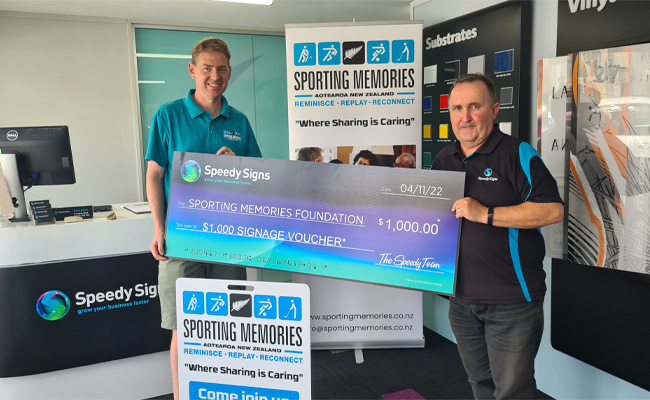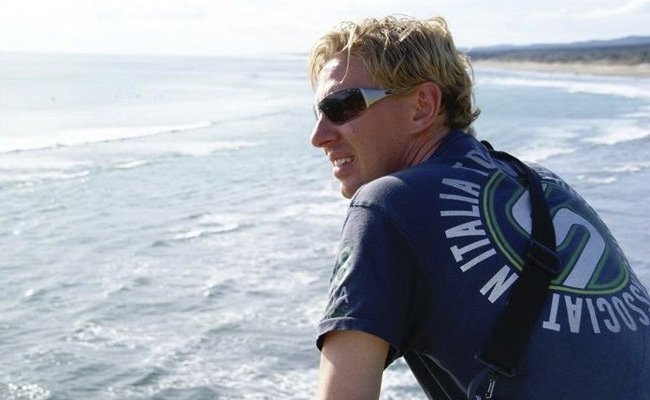
Dr Richard Wright (left) accepting a donation from the Speedy Signs team as part of the fundraising drive to set up the Sporting Memories Foundation Aotearoa New Zealand.
Harnessing the power of sport, to create a sense of belonging and improve mental and physical wellbeing as we age, is the motivation behind leisure sociologist Dr Richard Wright’s move to set up the Sporting Memories Foundation Aotearoa New Zealand.
Established last year, the Foundation is a charitable trust which supports the use of reminiscence and recreational therapy to help older adults living with dementia, depression and loneliness.
An Otago Tourism alumnus, Richard is Co-Director of the Auckland University of Technology (AUT) Centre for Active Ageing, and has spent his career studying how people engage with sports tourism and events, which has gradually transitioned into research in the active ageing space.
While always interested in sports nostalgia and heritage, such as sporting halls of fame and stadium tours, the trigger for his involvement in active aging was the 2014 World Veterans Table Tennis Championships in Auckland, the biggest veterans single sport tournament in the world.
“That event opened my eyes to this other world of sport, which I’d not really seen. This massive participation in the senior, masters and veterans [athlete] space,” he says. After being approached by the organisers, Richard ended up on the board, helping to leverage the event to grow interest in table tennis throughout New Zealand.
“I essentially fell in love with this 103-year-old table tennis player from Australia, Dorothy De Low. An icon of the table tennis world, Dorothy sadly didn’t make it to the tournament, but we ran a tribute for her. I remember going back to work going ‘we need to do work in this space’.”
He says there’s a lot known about how good sport is for young people, but it’s just as important as we age. Through the tournament he realised, “there was this whole population out there that we could help. That sport is essential to their wellbeing and leisure.”
Richard connected with new research groups being set up, including the Centre for Active Ageing, and the Never 2 Old exercise programme at AUT, which is specifically for over 65-year-olds.
He also immersed himself in the world of masters sport – picking up two bronze medals at the New Zealand Masters Games in Dunedin in 2018.
In 2019, he was approached about setting up a Sporting Memories network like one operating in the UK since 2011. The UK charity includes more than 160 groups, which meet regularly, with the emphasis on sharing sporting memories.
“In the UK it’s 90 per cent talking. It’s reminiscence therapy, unlocking those memories in your brain. That is at the heart of what the Sporting Memories Foundation is about. From my interest in recreational therapy, there’s getting them to sit around and talk, but once we’ve got them I think we should try to get them do a little bit of exercise, passing a ball around or going for a walk, some kind of physical movement.”
He says Sporting Memories ticks all the pillars of the Mental Health Foundation’s five ways of wellbeing – keep learning, give, connect, be active and take notice.
“The tag line we have gone with for the Sporting Memories Foundation is ‘sharing is caring’. It’s about sharing stories, sharing memories as a way of caring for people.”
To test the viability of the idea in Aotearoa, Richard established a pilot research project – named Glory Days - at two aged care facilities on the North Shore. The success of the groups has led to the formation of the Sporting Memories Foundation Aotearoa New Zealand, operating as a sister organisation of the UK network.
Still in the establishment phase, the NZ board is currently focussed on fundraising to make sure the Foundation has a solid base once it launches. Once up and running the Foundation will provide the framework, content and training for volunteer programme leaders to run active ageing sessions around the country. “Ultimately it will be over to the communities. It needs to be run by the communities for the community.”
Each session lasts a maximum of two hours, and is ideally run like a sports game, with the first half focussing on passing a ball round the group, allowing the person with the ball to decide the topic of the day. This is followed by oranges and a cup of tea at ‘half-time’, then preferably some kind of physical activity – it might be a walk in the local area, sit down bowls, darts or whatever suits the group. Depending on fundraising, they hope to have the first wave of clubs operating by the end of the year.
“It’s about sharing memories. It might be based on something happening right now – a rugby game or tennis or cricket - you get them talking, then let their minds wander back in time to their first rugby game, first team, colours. You let the conversation flow naturally.
“We call them clubs, so straight away there’s a sense of belonging. That will trigger memories of people following or belonging to a club. The reason it’s very local is we want people to feel like they belong to where they live. This is a sports club in their local community, as important as a bowls club or golf club.
“My research is around social capital theory and the importance of bonding with other people. We know when you feel detached, and you no longer belong in the world of sport or in your community - maybe because you retired or your partner was the major networker - we know that sport is one of the best tools proven in helping people belong.”
Richard says in terms of dementia, the research that underpinned the UK charity is that our long-term memory is the thing that leaves us last. “In many cases, people can remember their first XV rugby club from school, the name of the captain, particular games they played, girlfriends, boyfriends, the weather that day they played that game. These are people who will struggle to remember the name of their children or what they did yesterday or where they are even later in the session.
“We know ways of triggering memories is of value, even if they end up telling the same story every week, if it puts a smile on their face and you can see they joy that it’s giving them for that short-term escape, that’s of value.”

The Kiwi connection which created a career
Richard’s interest in sports tourism began during his undergraduate degree at the University of Brighton in the UK. His main inspiration was his Kiwi lecturer, Otago alumnus Dr Brent Ritchie, who was at the University teaching the tourism management course.
He credits Brent, his honours supervisor, for turning “an average student into one who got first class honours”.
After Brighton, Richard went back to his hometown of Cambridge and worked as a tourism planner at the city council. “About two years later when I realised there wasn’t much on my horizon that excited me, I got back in touch with Brent and said I was thinking about postgraduate study. He recommended Otago, he said it was one best places in the world to do tourism postgraduate studies.”
Richard went online and liked the look of the beaches, the countryside and the heritage. The fact the head of the school was Professor Michael Hall, who’d written the textbooks he’d used as an undergraduate, also played a part in his decision to apply.
“I loved it, absolutely loved it. I landed on Waitangi Day 2004. I still remember arriving at Dunedin airport, in the countryside, this small little country airport. I’d been travelling by myself the whole journey, tired, emotional, and I remember coming over the hill and seeing Carisbrook for the first time, seeing the coast and just felt this sense of excitement for what was going to come.”
While at Otago, Richard also played and coached university football, met his future wife in his first year, began tutoring and lecturing, and discovered his love of being an academic and teaching. He graduated with a Graduate Diploma (2004) and Master of Tourism (2006), then completed his PhD in 2011, and cites Professors Richard Mitchell and James Higham, his PhD supervisors, and Professor Brent Lovelock as hugely influential in his career.
“I never thought I’d go down that [academic] line, I thought I’d end up in strategic planning and policy . . . The real switch was when I got offered the chance to give a guest lecture related to my master’s topic, which was looking at the Lions Tour of 2005. It fell on my 25th birthday, and essentially from that moment I fell in love with sport tourism, and it went on to become my PhD. Everything I’ve done since was from that day onwards.”
After Otago, he spent a couple of years back in the UK with Leeds Beckett University, setting up a new degree in Sports Event Management at Headingley Stadium. He returned to New Zealand in 2011 to take up the position of lecturer in Sport Management at AUT and is now Programme Leader of the Graduate Diploma and Certificate in Sport and Exercise. He leads the Sport Leadership and Management Research Group and is a member of the Never 2 Old Research Cluster, both of which are situated within the Sports Performance Research Institute New Zealand (SPRINZ).
Richard has also been on the board of the Australian and New Zealand Association for Leisure Studies (ANZALS) since 2017, and will be facilitating an interactive session entitled Leisure across the Lifespan: Intergenerational Play & Sustainable Age-Friendly Environments (SAFE), at the 30th Anniversary Conference in Auckland this December, the week before he returns to Dunedin to speak at the World Leisure Congress. More details on the ANZALS Conference can be found at: www.anzals30thanniversaryconference.com
Kōrero by Margie Clark, Communications Adviser Development and Alumni Office